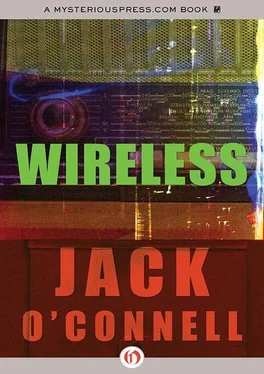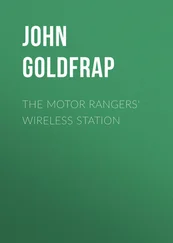G.T., it’s Wallace. Just wanted to let you know I’ve spoken with the doctors and Olga’s condition is stable. Sorry about last night. See you at Wireless. And G.T., could we keep the whole accident to ourselves?
He heads for the study, unlocks the reinforced sliding doors, rolls them back into the wall, leaves the lights off. He likes the kind of shadows he can get in this room, the way natural light will play off the ugly industrial-metal shelving that covers all the spare wall space. The study is soundproof. The floor is covered with a special, hard-to-get carpeting that the importer promised would “soak up eighty to ninety percent of your basic foot-level sound.” The carpet is odd-feeling under his feet. It makes the floor seem to dip in places as you cross the room. It’s a bland industrial gray, unpatterned. So far, Flynn thinks the importer told the truth.
At the far end of the room, in place of a desk, Flynn has an antique dentist’s chair complete with accompanying instrument pedestal, a big cold turret with jointed arms of drill, water gun, suction tube, fluorescent lights. There’s a round, swing-over tray attached to the pedestal and he uses this as a desktop. It suits his needs perfectly.
The rest of the room looks a lot like a small electronics warehouse. The rows of bolted-together metal racks give a hard-to-name glow to the room, an earthtone of some kind, partly dull green, partly gray-brown. The shelves are filled with stacks of boxy, matte-black hardware — world-band receivers, amps, equalizers, boosters, and recorders. Lined up on the shelf closest to the dentist’s chair are three Otari MTR-12 reel-to-reel recorders. On the shelf below them is an Icom IC-9000 receiver stacked atop a Japan Radio backup unit.
Flynn moves to the first reel-to-reel, hits the rewind toggle, waits a beat, hits the play toggle, and folds his arms across his chest. From the Bose speaker issues his own voice:
“—you took the route — husband, wife, family. You found the job. You found the house. You raced to the hospital, four A.M., the contractions coming faster, the water breaking on the cart into maternity, the pain. You brought her home. Look at the picture there, people, you brought the little girl home. It begins. Number two, number three. Days pass, you clean the house, you buy the used cars, you go to parents’ night. Hamburger Helper twice a week, so what?—”
Flynn massages his forehead with the tips of his fingers, then runs his hands back through his hair until he links his fingers behind his head. He does a minute of deep breathing, but images from last night at the airport start to flood, so he grabs the cordless phone off the swing tray and quickly punches in some numbers.
When Ferrie answers, Flynn says, “Open up the museum and tell the crybabies to sit down. I’m coming in to solve the whole feud.”
Ronnie knows there are things she should be doing. There’s two weeks’ worth of laundry sitting in the hamper and she hasn’t given the apartment a cleaning in at least that long. She should get the Jeep washed, do some banking, shop for a few groceries.
Instead she continues to lie on her stomach in the unmade bed, lazily eating the last of a bowl of Wheaties and washing the soggy flakes down with a generous Bloody Mary. The radio is tuned to some station out of Boston, one of those yuppie jobs that play soft jazz on the weekend mornings, music that starts out sort of relaxing and after an hour turns cloying. Ronnie doesn’t care. She just wants some white noise. And she definitely doesn’t want to hear WQSG.
It’s 10 A.M. on a Saturday. She’s looking at a self-help quiz in a magazine someone had left at the station. It’s one of those glossy fashion rags that run fifty pages of photos showing hundred-pound models with thick lips and sculpted bodies, followed by an article on “Why You Have a Poor Selfimage.”
The quiz is entitled “Do I Fear Intimacy?” and it’s illustrated with a black-and-white, shadowy photo of a man and a woman, both with wavy hair covering their shoulders. Both have wildly pronounced cheekbones. The couple is standing in some indistinct, urban alleyway. The man has his head inclined toward the woman. And she’s holding him at bay with her arm extended straight out and the palm of her hand pushing at his chest.
Ronnie stares at the photo for a few minutes before reading the first question. She thinks maybe there’s a way to determine why the couple is in an inner-city alley. There isn’t, so she grabs a felt marker from the nightstand and begins testing herself.
At first, the questions are pretty straightforward. You can see how they relate to the problem of intimacy. But halfway through the quiz they’re suddenly hitting her with “How often do you eat fast food?” and “How many times a month do you go to the movies?”
This line of questioning annoys Ronnie, but she persists and at the end she tallies her score and checks it against the score key. She rates in the bottom category, summed up with the explanation: “You are an island unto yourself. Your failure to share your life and open your heart to even your closest of lovers is deeply rooted in your past. Therapy beckons. Don’t give up hope. With time, patience, and hard work you can overcome your clammish ways and learn to share life and love with a giving partner.”
She throws the magazine against the wall and guzzles the last of the Bloody Mary. Then she rolls onto the edge of the bed, comes upright into a sitting position, runs her hands through her hair, looks at her watch, and says out loud, “I think we need to get some air.”
A half hour later, she’s showered, dressed in jeans, a red cotton sweater, and her oldest, favorite Keds. She steers the Jeep down Ziesing Ave and cranks up the volume on the radio as Chrissie Hynde belts out the end of “Thin Line Between Love and Hate,” then she pulls into the curb in front of a storefront that sports an enormous orange neon sign on the roof that blinks the words
Shockwave Riders
A Fantastic Fiction Bookshop
Ziesing Ave has become known as Bookstore Boulevard over the past couple of years. In addition to Shockwave, there’s Ephraim Beck’s, which specializes in mystery literature, Doc Kerrigan’s, which has the best poetry stock west of Boston, and Alexandria, which comprises two full floors of the old Streeter Mill and is filled to bursting with tens of thousands of used, unsorted, unpriced volumes.
Ronnie cuts the engine but sits in the Jeep for a minute studying the store. She’s never been inside, but drives past it several times a week and always gets a little jolt, a quick aesthetic buzz that she’s never bothered to analyze. Now, for the first time, she looks closer at the building and sees the extent of effort that went into its design.
The owner, Toby Odets, is a scion of one of the city’s oldest families and he dumped a good chunk of his trust fund into the renovation of a standard wood-frame, brick facade box of a store. Toby was determined to make the structure reflect the concerns of his stock and trade and he spared no expense in transforming the three thousand square feet of raw space into some kind of gleaming, immaculate jet age that never existed. He drew up the design himself, stealing liberally from Streamline Moderne and the Googie School, but straining it all through the sieve of his unique sensibility until it came out looking like a lost movie set from some high-budget 1950s drive-in space opera.
Toby started with the roof and erected a stainless-steel pylon, a sleek useless antennalike tower that was encircled by seven equidistant loops of different-colored neon. These circles of light flashed on and off in sequential order, bottom to top. At the lip of the roof he placed the neon Shockwave sign, then fashioned a soaring delta-wing canopy that shot out at its base and hung over the sidewalk like the streamlined fin of a comic book rocket. The edges of the wing were outfitted with a string of marquee-style blinking bulbs, alternating reds and whites. Extending from the front wall of the shop at a sharp angle to the sidewalk, Toby bolted mock-steel girders adorned with huge, functionless bolts and random-sized portholes. The two display windows were exaggerated bubbles of Plexiglas that dissolved into a stainless-steel fronting with all the corners rounded away.
Читать дальше












